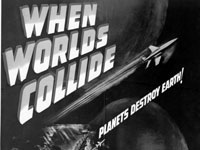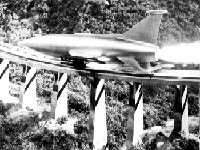PARALLAX REVIEWS:
When Worlds Collide (1951)
For Space.com


'Tis the time of the season when thoughts turn towards apocalyptic world destruction. When Worlds Collide retells a familiar biblical disaster, with scientists and a spaceship replacing Noah and his Ark.
South African courier Dave Randall (Richard Derr) is unknowingly carrying the documents detailing the end of the world. It seems that two rapidly approaching celestial bodies, Bellus and it's satellite Zyra, are on a collision course with Earth in a mere eight months. Sexy scientist Joyce Hendron (Barbara Rush, who will later battle gigantic eyeballs in It Came from Outer Space) takes a liking to Randall and briefs him on the impending disaster. The collision calculations are run through a differential analyzer, a state-of-the-art Turing machine that labors loudly and spits out a confirmation. 1951, incidentally, was the year that UNIVAC (the first universal automatic computer) was invented.
Newfangled computer results bear no weight in the community, as Joyce's father (Larry Keating) discovers when he's laughed out of the United Nations and Congress with his doomsday news. He didn't even reach his punchline - Zyra may be able to sustain human life, and Dr. Hendron wants to build a spaceship and launch people to the surface. Alas, he's forced to turn to special interest groups for his funding - namely the cranky crippled millionaire, Sydney Stanton (John Hoyt). Mr. Stanton forks over the money on the condition that he's given one of the seats on the ship and the opportunity to be generally annoying for the rest of the film.
Funding intact, the building of the spaceship begins. Six hundred young men and women are lured to work long hours with lousy pay on the hopes that one of them will be picked for the forty-member crew. The ship is nearing completion when Zyra first passes near Earth, a scant 19 days before the final collision. While it would make the most sense to leave for Zyra at that time, the scientists hold off, presumably to watch George Pal's Oscar-winning destruction scenes of New York City.
Post destruction, Randall and Joyce's former fiancée Dr. Drake (Peter Hanson) set out in search of survivors. They find one of those horrendously annoying sci-fi tykes and transport him back to the ship. Dr. Hendron, who's awfully free with the limited seats, promises the kid and his dog a seat at the unspoken cost of one of the crew.


Finally, the day of the apocalypse is at hand. The remaining crew has been picked (it's a bit disconcerting to realize that Zyra will be populated by an all-white contingency), and the other workers are wising up and threatening mutiny. At the last minute, Dr. Hendron pulls the pistol-packing Stratton off the ramp and physically restrains him from boarding, justifying that future planet is only for the young. The ship, minus the old men, flies off a roller-coaster launch pad as Bellus fatally collides with Earth.
After an uneventful trip, the ship lands on Zyra, where the air is not only breathable but the surface uncannily resembles a quaint Alpine valley full of green grass, snow and flowers. The scientists emerge in their new Eden and watch their first sunrise, filtered through the last remains of Earth, as credits roll.
Several improbabilities occur when the worlds collide, the first and foremost being the general acceptance of world destruction. Everyone seems frozen into inaction except for the privately-funded scientists, and there are no further attempts at saving Earth. Humanity, it seems, is not worth saving.
As far as humanity goes, it should be noted that grouchy Stanton put up the money for his seat in good faith. It's rather presumptuous of Dr. Hendron to deny Stanton his seat in order to save fuel for the youngsters. Dr. Hendron, it seems, enjoys playing god by deciding who gets to survive. There's an ominous feel of enforced Darwinism at work, with the crippled, old members making way for the younger ones.
As for the survivors, who seem none too depressed over the obliteration of Earth, it seems likely that Zyra's orbit would suffer adversely with the planet-destroying collision and that the sun's gravitational pull would suck them in. Even under the best circumstances, the survivors seem amazingly short-sighted, transporting unwieldy, food-devouring livestock instead of grains and seeds. The survivors may have reached an Edenic paradise, but for how long?